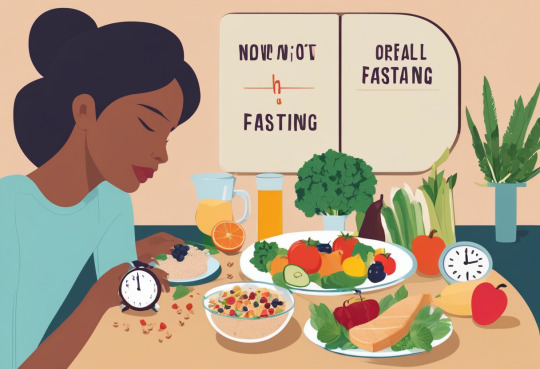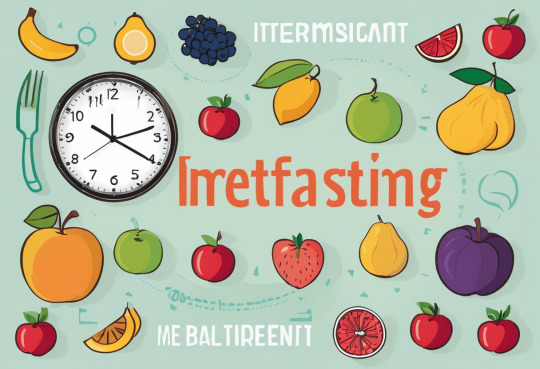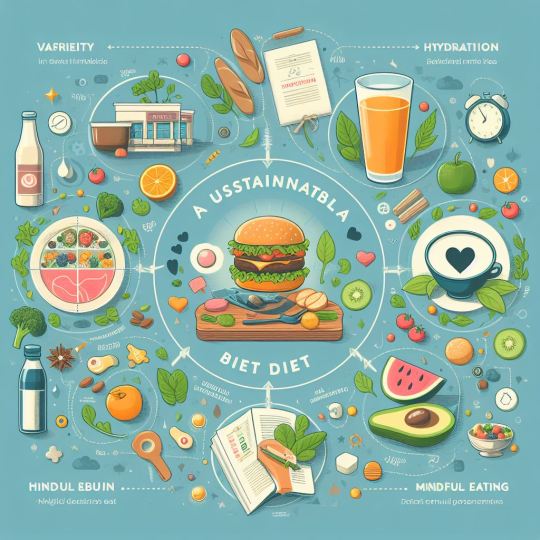Video
In this video, we will guide you on how to distinguish between allergies and sickness based on essential health knowledge.
Learn the key differences in symptoms, causes, and treatment options to better understand your body's signals.
Watch till the end for practical tips on managing allergies and illnesses effectively.
If you find this video helpful, don't forget to give it a thumbs up and share it with your friends and family to spread the knowledge!
AllergiesVsSickness #HealthTips #StayInformed
dietandweightloss
#healthyeatingtips , #صحة #allergy, #الحساسية, #cold, #برد #allergysymptoms, #coldsymptoms, #allergy_treatment #seasonalallergies, #موسم_الحساسية #howtotell, #doctorconsultation
youtube
الحساسية أو المرض؟ إليك كيفية معرفة ذلك! #شورت #قصير
#health#allergy#cold#youtube#allergy_treatment#allergysymptoms#coldsymptoms#seasonalallergies#doctorconsultation#howtotell
1 note
·
View note
Text
60 Seconds to Healthier Eating Habits
In this quick 60-second video, we're serving up valuable nutritional tips to help you make healthier choices every day!
Whether you're new to nutrition or looking for a refresher, this video is packed with easy-to-follow advice.
Remember, these tips are general and may not be suitable for everyone, so be sure to consult with a healthcare professional for personalized guidance.
Watch, like, and share this video to spread the word on the importance of good nutrition!
2 notes
·
View notes
Text
Unleash Your Strength: The #Weight_Loss Journey
In this inspiring video, we delve into the transformative journey of weight loss, highlighting the incredible power of perseverance and self-belief.
If you're looking for motivation and guidance to kickstart your own transformation, this video is a must-watch!
Learn practical tips, hear motivational stories, and discover the mindset shifts needed to succeed on your weight loss journey.
Remember, your goals are within reach – all you need is the right mindset and determination.
Like and share this video to inspire others on their path to a healthier and happier life!
2 notes
·
View notes
Text
Intermittent Fasting: Benefits and How It Works

Discover how intermittent fasting works and explore its benefits. Get Intermittent Fasting Explained and learn about this popular dietary approach.
Here's an overview:
Introduction to Intermittent Fasting
The Benefits of Intermittent Fasting
The Science Behind Intermittent Fasting
Introduction to Intermittent Fasting

Intermittent fasting is an eating pattern where I cycle between periods of eating and fasting. It doesn't prescribe specific foods but rather focuses on when I should eat them. This approach can aid in weight loss, improve metabolic health, and even enhance brain function. By restricting the eating window, I allow my body to burn stored fat for energy instead of relying on incoming food. Different intermittent fasting methods suit various lifestyles, making it a flexible and potentially effective way to manage weight and promote overall well-being.
The Benefits of Intermittent Fasting

Intermittent fasting can aid in weight loss by promoting fat burning and reducing calorie intake.
It may improve metabolic health by lowering insulin resistance and reducing inflammation in the body.
Intermittent fasting has been linked to increased longevity and improved brain health.
It can simplify meal planning and save time by reducing the number of meals consumed daily.
I have personally experienced increased energy levels and mental clarity when practicing intermittent fasting.
The Science Behind Intermittent Fasting

Intermittent fasting triggers autophagy, a process where cells repair and remove dysfunctional components, contributing to longevity.
Fasting decreases insulin levels, increasing human growth hormone secretion and enhancing fat burning.
It improves metabolic health by reducing inflammation, oxidative stress, and improving insulin sensitivity.
Fasting may boost brain function by promoting the production of brain-derived neurotrophic factor (BDNF), supporting cognitive function.
1 note
·
View note
Video
youtube
Intermittent Fasting: A Quick Guide #shorts #diet #intermittentfasting…
1 note
·
View note
Text
The Secret of Low-Calorie Recipes for Weight Loss

In the vast world of culinary delights, a question often arises - can delectable dishes also be low in calories?
The answer is a resounding "Yes!"
Embark on an epicurean journey where taste meets health, exploring a bounty of low-calorie recipes that are as pleasing to the palate as they are to the waistline.
From the vibrant freshness of a Mediterranean salad to the comforting warmth of a vegetable stir-fry, these recipes are brimming with flavour, not calories.
Picture a plate of zucchini noodles, doused in a tangy tomato sauce, or a bowl of cauliflower rice, lightly spiced and studded with colourful vegetables.

Imagine a dessert of fresh berries, their natural sweetness enhanced with a touch of honey and a squeeze of lemon.
These are not just meals, but a lifestyle choice.
So why choose low-calorie recipes?
The secret lies not just in their weight loss benefits, but also in their ability to nourish the body with essential nutrients.
It's about creating a balance, a harmony of flavours, that satisfies the soul as well as the stomach.
Are you curious to know more?
Want to unlock the secrets to these mouth-watering, low-calorie recipes?
Then stay tuned.
Subscribe for more content and be a part of this culinary revolution where health and taste coexist beautifully.
Remember, a delicious journey awaits.
2 notes
·
View notes
Video
youtube
A Healthy Journey: 5 Golden Nutrition Tips in 60 Seconds #shorts*
Are you looking to improve your nutrition habits but short on time?
Look no further!
In this quick and informative video, we're sharing valuable nutrition tips that can help you lead a healthier lifestyle in just 60 seconds.
From simple meal planning ideas to easy snack swaps, you'll discover practical advice to elevate your nutrition game effortlessly.
Don't forget to like and share this video with your friends and family who could benefit from these tips!
Let's take a step towards a healthier you together.
Basic Nutrition Tips Essential Dietary Practices Quick and Easy Nutrition Hacks Healthy Meal Planning Strategies Balanced Snacking Options Nutrition for Beginners 60-Second Guide to Better Eating Improve Your Diet in 1 Minute Simple Steps to Healthy Eating Habits Foundational Nutrition Knowledge Weight Loss Journey Diet and Weight Loss Tips Intermittent Fasting Explained Healthy Meal Plans for Weight Loss Low-Calorie Recipes for Weight Loss Calorie Counting for Beginners Mindful Eating for Weight Loss Exercise Routines for Weight Loss Weight Loss Motivation and Inspiration Sustainable Weight Loss Strategies
#shorts #HealthyEatingTips #NutritionBasics #QuickNutritionHacks #MealPlanningMadeEasy #HealthySnackIdeas #NutritionForBeginners #60SecondHealth #EatHealthyInAMinute #HealthyHabitsStartHere #Nutrition101 #diet #Diet #WeightLossJourney #DietAndWeightLoss #IntermittentFasting #HealthyMealPlans #LowCalorieRecipes #CalorieCounting #MindfulEating #WeightLossExercises #WeightLossMotivation #SustainableWeightLoss
#youtube#sustainableweightloss#weight loss exercises#shorts HealthyEatingTips NutritionBasics QuickNutritionHacks MealPlanningMadeEasy HealthySnackIdeas NutritionForBeginners 60SecondHealth Eat#dite#nutrition
1 note
·
View note
Text
Elevate Your Mental Well-being: A Call to Prioritize Self-Care"




Attention all followers!
It's time to prioritize our mental well-being. In a world where we are constantly connected and bombarded with information, it's easy to forget to take care of ourselves.
Let's make a conscious effort to prioritize our psychological health.
This means taking breaks from social media, practicing self-care, and seeking help when needed. Remember, a healthy mind leads to a happier life.
Let's support and encourage each other to prioritize our mental well-being.
#PsychologicalHealth #SelfCare #MentalWellness #TakeABreak #SupportEachOther
Join us for more insights and tips on prioritizing mental health! #FollowForMore"
2 notes
·
View notes
Text

Thank you @abouebrahim-blog and everyone who got me to 5 reblogs!
Unlocking the Secrets of Wellness: Navigating the Path to a Balanced and Vibrant Life Through Nutrition

As we are all aware, maintaining a nutritious diet is imperative for our overall well-being.
However, amidst the inundation of information and conflicting advice, finding the right starting point can be daunting. As a health and wellness influencer, I have witnessed numerous individuals grappling with the quest for an ideal diet tailored to their lifestyle.
Hence, I seize this opportunity to delve into the significance of adopting a sustainable and well-balanced dietary regimen that resonates with you.

Primarily, it's pivotal to acknowledge that there's no one-size-fits-all solution when it comes to dieting.
Each person is unique, and what may work for one might not yield the same results for another.
Thus, it's imperative to attune yourself to your body's signals and ascertain a dietary approach that aligns with your specific requirements and objectives.

One of the most prevalent pitfalls individuals encounter in their dietary journey is succumbing to fad diets or extreme eating patterns.
While these might promise swift outcomes, they often prove to be unsustainable in the long haul and could even jeopardize your health.
Instead, prioritize the integration of whole, nutrient-rich foods into your diet and strive to strike a balance that suits you.
Another pivotal facet of a wholesome diet is diversity.

Embracing a spectrum of foods ensures you're reaping the benefits of all essential nutrients vital for your body's optimal functioning.
Additionally, it enhances meal enjoyment and staves off monotony.
Don't shy away from exploring new culinary horizons and experimenting with diverse recipes to discern your preferences.
In tandem with a balanced diet, it's imperative to maintain adequate hydration levels and curtail your consumption of processed and sugary fare.

Hydrating sufficiently and eschewing processed foods can wield a profound impact on your overall health and vitality.
Moreover, it's imperative to recognize that a healthy diet transcends mere food choices; it encompasses how you approach eating as well.
Mindful eating entails fostering an awareness of your food intake, relishing each morsel, and attuning yourself to your body's hunger and satiety cues.
By embracing mindful eating practices, you can foster a healthier relationship with food and avert overindulgence.
Lastly, I underscore the importance of seeking professional guidance pertaining to your dietary endeavors.

Consulting with a registered dietitian can aid in crafting a personalized meal plan tailored to meet your specific requisites and aspirations.
Furthermore, they can furnish invaluable insights and support to facilitate the maintenance of a wholesome diet in the long run.
In summation, the pursuit of a sustainable and well-balanced diet is paramount for our holistic health and well-being.
It's imperative to heed your body's cues, embrace diversity, and stay hydrated.
To embark on a journey of continuous learning and glean further insights for optimal well-being, follow us for more information."
3 notes
·
View notes
Text
Unlocking the Secrets of Wellness: Navigating the Path to a Balanced and Vibrant Life Through Nutrition

As we are all aware, maintaining a nutritious diet is imperative for our overall well-being.
However, amidst the inundation of information and conflicting advice, finding the right starting point can be daunting. As a health and wellness influencer, I have witnessed numerous individuals grappling with the quest for an ideal diet tailored to their lifestyle.
Hence, I seize this opportunity to delve into the significance of adopting a sustainable and well-balanced dietary regimen that resonates with you.

Primarily, it's pivotal to acknowledge that there's no one-size-fits-all solution when it comes to dieting.
Each person is unique, and what may work for one might not yield the same results for another.
Thus, it's imperative to attune yourself to your body's signals and ascertain a dietary approach that aligns with your specific requirements and objectives.

One of the most prevalent pitfalls individuals encounter in their dietary journey is succumbing to fad diets or extreme eating patterns.
While these might promise swift outcomes, they often prove to be unsustainable in the long haul and could even jeopardize your health.
Instead, prioritize the integration of whole, nutrient-rich foods into your diet and strive to strike a balance that suits you.
Another pivotal facet of a wholesome diet is diversity.

Embracing a spectrum of foods ensures you're reaping the benefits of all essential nutrients vital for your body's optimal functioning.
Additionally, it enhances meal enjoyment and staves off monotony.
Don't shy away from exploring new culinary horizons and experimenting with diverse recipes to discern your preferences.
In tandem with a balanced diet, it's imperative to maintain adequate hydration levels and curtail your consumption of processed and sugary fare.

Hydrating sufficiently and eschewing processed foods can wield a profound impact on your overall health and vitality.
Moreover, it's imperative to recognize that a healthy diet transcends mere food choices; it encompasses how you approach eating as well.
Mindful eating entails fostering an awareness of your food intake, relishing each morsel, and attuning yourself to your body's hunger and satiety cues.
By embracing mindful eating practices, you can foster a healthier relationship with food and avert overindulgence.
Lastly, I underscore the importance of seeking professional guidance pertaining to your dietary endeavors.

Consulting with a registered dietitian can aid in crafting a personalized meal plan tailored to meet your specific requisites and aspirations.
Furthermore, they can furnish invaluable insights and support to facilitate the maintenance of a wholesome diet in the long run.
In summation, the pursuit of a sustainable and well-balanced diet is paramount for our holistic health and well-being.
It's imperative to heed your body's cues, embrace diversity, and stay hydrated.
To embark on a journey of continuous learning and glean further insights for optimal well-being, follow us for more information."
3 notes
·
View notes
Text
Dealing with Eating Disorders: Anorexia and the Importance of Balanced Nutrition

Dealing with Eating Disorders: Anorexia and the Importance of Balanced Nutrition
Here's an overview:
Introduction to Eating DisordersSigns and Symptoms
Emotional Impact
Seeking Professional Help
Importance of Balanced Nutrition
Understanding AnorexiaSigns and symptoms of anorexia include:
Treatment for anorexia often involves a combination of:
Causes and Risk Factors of Anorexia
Signs and Symptoms of Anorexia
Diagnosis of Anorexia
Treatment Options for Anorexia
Cognitive Behavioral Therapy for Anorexia
Family-Based Treatment (FBT) for Anorexia
Medication and Nutritional Therapy for Anorexia
Supporting a Loved One with Anorexia
Conclusion and Recovery from Anorexia
Introduction to Eating Disorders
Eating disorders are complex mental health conditions that can have serious physical consequences. As someone who has struggled with anorexia, I understand the challenges and the importance of raising awareness about these issues. When it comes to eating disorders, it's crucial to remember that they are not just about food or weight; they often stem from deeper emotional and psychological struggles.
Signs and Symptoms
Restricting Food Intake: This can involve skipping meals, limiting caloric intake, or avoiding certain food groups.
Preoccupation with Weight and Body Image: Constantly checking weight, body measurements, or appearance in the mirror.
Physical Changes: Rapid weight loss, fatigue, dizziness, hair loss, and irregular menstruation in females.
Social Withdrawal: Avoiding social gatherings that involve food or making excuses to avoid meals.
Emotional Impact
Living with an eating disorder can be isolating and overwhelming. It's common to experience feelings of shame, guilt, and worthlessness. I found that seeking support from loved ones, therapists, or support groups was instrumental in my recovery journey. Remember, you are not alone, and it's okay to ask for help.
Seeking Professional Help
If you suspect you or someone you know is struggling with an eating disorder, it's essential to seek help from a healthcare provider. A comprehensive treatment plan may include therapy, nutritional counseling, and medical monitoring. Remember, recovery is possible with the right support and resources.
Importance of Balanced Nutrition
Nutrition plays a crucial role in recovery from anorexia. Working with a dietitian to create a balanced meal plan can help restore physical health and promote mental well-being. It's vital to nourish your body with a variety of nutrients and food groups to support healing and recovery.
As we delve deeper into understanding anorexia and its effects, it's essential to approach these topics with empathy, education, and a commitment to breaking the stigma surrounding eating disorders.
Understanding Anorexia
I have struggled with anorexia in the past, and I know firsthand how challenging it can be. Anorexia is not just about wanting to be thin; it is a serious mental health disorder that can have severe consequences if left untreated. People with anorexia often have an intense fear of gaining weight, distorted body image, and a relentless pursuit of thinness.
Signs and symptoms of anorexia include:
Significant weight loss: An individual may have a body weight that is significantly below a healthy range for their age and height.
Restrictive eating habits: Constantly monitoring food intake, avoiding certain foods, and restricting calories.
Intense fear of gaining weight: Obsessively weighing themselves and expressing intense anxiety about weight gain.
Distorted body image: Seeing themselves as overweight even when underweight.
Physical symptoms: Fatigue, dizziness, fainting, and hair loss.
If you suspect that you or someone you know may have anorexia, it is crucial to seek help from a healthcare professional. Anorexia can have serious health consequences, including organ damage, osteoporosis, and in severe cases, it can be life-threatening.
Treatment for anorexia often involves a combination of:
Nutritional therapy: Working with a registered dietitian to create a meal plan that ensures adequate nutrition.
Therapy: Cognitive-behavioral therapy (CBT) or other forms of psychotherapy can help address underlying issues and change harmful thought patterns.
Medical monitoring: Regular check-ups with healthcare providers to monitor physical health and address any complications.
Remember, recovery from anorexia is possible with the right support and treatment. It's essential to reach out for help and not try to battle this disorder alone.
Causes and Risk Factors of Anorexia
I. Causes of Anorexia:
Genetics: Some studies suggest that genetics play a role in the development of anorexia. If someone in your family has struggled with an eating disorder, you may be at a higher risk of developing it as well.
Psychological Factors: Anorexia is often linked to underlying psychological issues such as low self-esteem, perfectionism, and anxiety. These factors can contribute to a negative body image and a preoccupation with food and weight.
Societal Pressures: Living in a culture that idealizes thinness can also influence the development of anorexia. Media images promoting unrealistic body standards can contribute to feelings of inadequacy and drive individuals to extreme dieting behaviors.
II. Risk Factors of Anorexia:
Gender: Anorexia is more common in females, but it can also affect males. The pressure to conform to societal standards of beauty and thinness can impact individuals of any gender.
Age: Anorexia commonly begins during adolescence or young adulthood, but it can develop at any age.
Co-occurring Mental Health Issues: Individuals with other mental health conditions such as anxiety disorders, depression, or obsessive-compulsive disorder may be at a higher risk of developing anorexia.
History of Dieting: Previous experiences with dieting or weight loss efforts can increase the likelihood of developing disordered eating behaviors.
Traumatic Events: Trauma, such as childhood abuse or bullying, can also contribute to the development of anorexia as a coping mechanism.
Understanding the causes and risk factors of anorexia is essential in addressing and supporting individuals struggling with this eating disorder. By recognizing these factors, we can provide appropriate interventions and promote a healthier relationship with food and body image.
Signs and Symptoms of Anorexia
I have listed below some common signs and symptoms of anorexia that you should be aware of:
Severely restricted eating: I may notice that I am drastically limiting my food intake, often to the point of starvation, or only consuming tiny portions.
Intense fear of gaining weight: I might exhibit an overwhelming fear of gaining weight or becoming fat, even if I am underweight.
Distorted body image: I may perceive myself as overweight, despite being underweight.
Preoccupation with food, calories, and dieting: I may constantly think about food, counting calories, and researching diet plans.
Excessive exercise: I might engage in relentless and extreme exercise routines, regardless of fatigue or injury.
Physical symptoms: I may experience physical manifestations such as fatigue, dizziness, brittle nails, hair loss, and feeling cold all the time.
Social withdrawal: I might withdraw from social activities that involve food or gatherings where my eating habits may be scrutinized.
Secrecy around eating: I may start hiding or lying about the food I eat and avoiding meals with others to conceal my restrictive eating habits.
If you notice any of these signs or symptoms in yourself or a loved one, it is crucial to seek professional help and support as early intervention is key in treating anorexia effectively.
Diagnosis of Anorexia
I diagnose anorexia by conducting a thorough assessment that includes a physical exam, a review of medical history, and a discussion of eating habits and attitudes towards food. Here's how I go about diagnosing anorexia:
Physical Examination: I begin with a physical examination to check for any physical signs of anorexia, such as low body weight, fatigue, and brittle hair and nails.
Medical History Review: I take a detailed medical history to understand any underlying medical conditions or family history of eating disorders.
Discussion of Eating Habits: I have a conversation with the individual about their eating habits, including their relationship with food, any restrictive behaviors, and perceptions of body image. This helps me understand their mental and emotional state regarding food.
Assessment of Psychological Symptoms: I assess for psychological symptoms such as anxiety, depression, obsessive-compulsive tendencies, and distorted body image, as these are often present in individuals with anorexia.
Diagnostic Criteria: I also refer to the Diagnostic and Statistical Manual of Mental Disorders (DSM-5) criteria for anorexia nervosa, which includes criteria related to restriction of food intake, intense fear of gaining weight, and a disturbance in the way one's body weight or shape is experienced.
Overall, the diagnosis of anorexia is a complex process that involves a comprehensive assessment of physical, psychological, and behavioral factors. It is crucial to approach the diagnosis with sensitivity and empathy to provide the individual with the necessary support and treatment.
Treatment Options for Anorexia
When it comes to treating anorexia, it's essential to have a comprehensive approach that addresses both the physical and psychological aspects of this eating disorder. Here are the main treatment options available:
Medical Intervention:
I may require medical monitoring to address any physical complications that have arisen due to anorexia, such as malnutrition, electrolyte imbalances, or heart problems. It's crucial to work closely with healthcare providers to stabilize my health.
Nutritional Counseling:
Working with a registered dietitian can help me develop a balanced meal plan that meets my nutritional needs and supports my recovery. Learning how to nourish my body properly is a crucial step in overcoming anorexia.
Therapy:
Therapy plays a vital role in treating anorexia, especially since it's often linked to underlying emotional issues. Cognitive-behavioral therapy (CBT), family therapy, or other forms of psychotherapy can help me understand the factors contributing to my eating disorder and develop healthier coping mechanisms.
Support Groups:
Joining a support group for individuals struggling with eating disorders can provide me with a sense of community and understanding. Sharing experiences and receiving encouragement from others going through similar challenges can be incredibly beneficial.
Medication:
In some cases, doctors may prescribe medications to manage symptoms such as depression, anxiety, or obsessive-compulsive behaviors that often co-occur with anorexia. These medications should be used in combination with therapy and other treatments.
Remember, the road to recovery from anorexia can be challenging, but with the right treatment and support, it is possible to develop a healthier relationship with food and body image.
Cognitive Behavioral Therapy for Anorexia
I believe that Cognitive Behavioral Therapy (CBT) is a crucial component in the treatment of anorexia. Here are some reasons why I find CBT to be effective:
Identifying Negative Thought Patterns: In CBT, I can work with a therapist to identify and challenge negative thought patterns related to body image, self-worth, and food. This process helps me understand how these thoughts contribute to my behaviors.
Developing Coping Strategies: Through CBT, I learn effective coping strategies to deal with triggers that may lead to disordered eating behaviors. I can develop healthier ways to manage stress, anxiety, or low self-esteem without resorting to restrictive eating habits.
Changing Destructive Behaviors: CBT helps me replace harmful behaviors with positive ones. By addressing the underlying issues driving my anorexia, I can make sustainable changes towards a healthier relationship with food and my body.
Improving Self-Esteem: CBT can assist me in improving my self-esteem and body image perceptions. I can work on developing a more positive self-image based on realistic and healthy beliefs.
Building Relapse Prevention Skills: With CBT, I can acquire tools to recognize early warning signs of relapse and implement strategies to prevent a recurrence of anorexic behaviors. This proactive approach equips me with the skills needed to maintain recovery in the long term.
In conclusion, Cognitive Behavioral Therapy plays a vital role in addressing the psychological aspects of anorexia and promoting lasting recovery by changing negative thought patterns, developing coping strategies, and enhancing self-esteem.
Family-Based Treatment (FBT) for Anorexia
I have found that Family-Based Treatment (FBT) is a highly effective approach when dealing with anorexia. In FBT, the family plays a crucial role in the treatment process. Here are some key points about FBT:
Involvement of Family: FBT recognizes the impact of family dynamics on an individual with anorexia. It involves the entire family in the treatment process, focusing on empowering parents to take charge of refeeding their child.
Empowering Parents: The primary goal of FBT is to empower parents to become agents of change in their child's recovery. As a therapist, I work closely with parents to help them support their child in restoring a healthy relationship with food.
Phases of Treatment: FBT is typically divided into three phases. The first phase focuses on weight restoration, the second on returning control of eating back to the adolescent, and the third on promoting healthy adolescent development.
Non-Blaming Approach: FBT is non-blaming and aims to reduce feelings of guilt or shame within the family. It helps parents understand that anorexia is not anyone's fault but rather a serious mental health condition that requires treatment.
Evidence-Based: FBT is supported by research as an effective treatment for adolescent anorexia. Studies have shown that FBT leads to higher rates of full remission compared to individual therapy.
I have seen firsthand the positive impact that FBT can have on individuals struggling with anorexia. By involving the family in the treatment process and empowering parents to take an active role, FBT can help adolescents make significant strides towards recovery and long-term health.
Medication and Nutritional Therapy for Anorexia
I have found that medication can be a useful tool in the treatment of anorexia. In some cases, antidepressants may be prescribed to help manage symptoms such as anxiety and depression that often accompany anorexia. These medications can assist in improving mood and overall mental well-being, which can be crucial in the recovery process. It is essential to work closely with a healthcare provider to find the right medication and dosage that will be most effective for each individual.
Nutritional therapy is another key aspect of treating anorexia. Working with a registered dietitian who specializes in eating disorders can be incredibly beneficial. They can help create a meal plan that focuses on restoring a healthy relationship with food, ensuring that essential nutrients are being consumed, and supporting weight restoration in a safe and sustainable way.
Medication, particularly antidepressants, can help manage symptoms like anxiety and depression in anorexia.
Collaboration with a healthcare provider is crucial to finding the most effective medication and dosage.
A registered dietitian specializing in eating disorders can assist with creating a balanced meal plan.
The meal plan will focus on restoring a healthy relationship with food and supporting weight restoration.
As part of a comprehensive treatment plan, medication and nutritional therapy can play vital roles in addressing both the physical and emotional aspects of anorexia. It is important to remember that recovery is a journey, and finding the right combination of treatments may take time. Working closely with a team of healthcare providers including therapists, doctors, and dietitians can help ensure the best possible outcomes in the treatment of anorexia.
Supporting a Loved One with Anorexia
I have witnessed firsthand the challenges of supporting a loved one struggling with anorexia. Here are some ways to offer support:
Educate Yourself: Learn about anorexia to understand what your loved one is going through. Knowing the facts can help you provide better support.
Encourage Professional Help: Encourage your loved one to seek professional help from doctors, therapists, and nutritionists specialized in eating disorders.
Provide Emotional Support: Be there for your loved one, listen without judgment, and offer emotional support. Anorexia can be emotionally draining, so providing a safe space for them to express their feelings is crucial.
Promote a Positive Body Image: Avoid making comments about weight or appearance. Instead, focus on positive qualities unrelated to physical appearance.
Encourage Balanced Nutrition: Encourage your loved one to eat balanced meals and snacks. Offer to cook together or plan meals that are nutritious and appealing.
Avoid Power Struggles: It's essential to approach food and eating habits with empathy and understanding. Avoid power struggles or making them feel guilty about their eating habits.
Set Boundaries: While offering support, it's also important to set boundaries to protect your own well-being. Seek support for yourself through therapy or support groups.
Remember, supporting a loved one with anorexia can be challenging, but with patience, understanding, and professional guidance, you can help them on their journey to recovery.
Conclusion and Recovery from Anorexia
I have learned that recovery from anorexia is a complex and challenging journey that requires patience, commitment, and professional help. Here are some key points to consider during the recovery process:
Seek Professional Support: It is crucial to work with a team of healthcare providers, including doctors, therapists, and dietitians, who specialize in eating disorders. They can provide the necessary guidance and support to help you recover.
Establish Healthy Eating Habits: Creating a meal plan that focuses on balanced nutrition is essential for recovery. It is important to nourish your body with a variety of foods to support physical and mental well-being.
Challenge Negative Thoughts: Anorexia often involves distorted beliefs about body image and food. Cognitive-behavioral therapy can help challenge these negative thoughts and develop a healthier mindset.
Build a Support System: Surrounding yourself with supportive friends and family members can make a significant difference in your recovery journey. Opening up about your struggles and seeking help when needed is a sign of strength.
Practice Self-Care: Engaging in activities that promote self-care, such as mindfulness, yoga, or journaling, can help manage stress and improve overall well-being during recovery.
Monitor Progress: Keep track of your progress by setting achievable goals and celebrating small victories along the way. Remember that recovery is a gradual process, and setbacks may occur.
Remember, recovery from anorexia is possible with the right support and dedication. Taking care of your physical and emotional health is vital in overcoming this eating disorder. You are not alone in this journey, and seeking help is the first step towards a healthier and happier life.
3 notes
·
View notes
Text
The Impact of Psychological Health on Weight Loss Diet Success

The Impact of Psychological Health on Weight Loss Diet Success
Here's an overview:
Understanding the Connection Between Psychological Health and Weight Loss
The Role of Stress and Emotional Well-being in Dieting Success
Overcoming Psychological Barriers to Sustainable Weight Loss
Mindful Eating and Its Impact on Psychological Health and Weight Loss
The Influence of Self-esteem and Body Image on Diet Success
The Power of Positive Thinking in Achieving Weight Loss Goals
Addressing Emotional Eating and Stress-induced Food Cravings
Coping Strategies for Dealing with Emotional Challenges During Weight Loss Journey
Seeking Professional Help: The Importance of Mental Health Support in Weight Management
Incorporating Mind-Body Practices for Holistic Wellness and Successful Weight Loss
Understanding the Connection Between Psychological Health and Weight Loss
I believe that psychological health plays a crucial role in the success of weight loss diets. Here are some key points to consider:
Emotional Eating: Emotional well-being can impact eating habits. Stress, anxiety, or depression can lead to emotional eating, where food is used as a coping mechanism.
Motivation and Discipline: A positive mindset and strong mental health are vital for staying motivated and disciplined throughout a weight loss journey.
Self-image: How we perceive ourselves can affect our weight loss efforts. Positive self-image is linked to better adherence to healthy habits.
Stress Management: Effective stress management techniques can prevent emotional eating and promote healthier choices.
Support System: Surrounding yourself with a supportive network can enhance psychological well-being and increase weight loss success.
Understanding and addressing the connection between psychological health and weight loss is essential for achieving sustainable results.
The Role of Stress and Emotional Well-being in Dieting Success
I believe that managing stress is crucial for successful weight loss. When we are stressed, our bodies release cortisol, a hormone that can lead to weight gain, especially around the midsection. Stress can also trigger emotional eating, causing us to reach for comfort foods high in sugar and fat.
To improve emotional well-being while dieting, I suggest practicing mindfulness techniques such as deep breathing, meditation, or yoga. These activities can help reduce stress levels and prevent emotional eating episodes. Additionally, seeking support from a counselor or therapist can be beneficial in addressing underlying emotional issues that may contribute to unhealthy eating habits.
Overall, taking care of our emotional health is just as important as monitoring our food intake when it comes to achieving successful weight loss.
Overcoming Psychological Barriers to Sustainable Weight Loss
I believe that addressing psychological barriers is crucial for achieving long-term success in weight loss. To overcome these barriers, I focus on the following strategies:
Identifying Triggers: I pinpoint situations or emotions that lead to unhealthy eating habits.
Building Resilience: I work on developing coping mechanisms to deal with stress or negative emotions without turning to food.
Setting Realistic Goals: I set achievable targets to prevent feelings of failure that may hinder progress.
Practicing Mindfulness: I cultivate mindfulness to foster better awareness of my eating behaviors and emotions.
By actively working on these aspects, I can overcome psychological barriers and maintain sustainable weight loss successfully.
Mindful Eating and Its Impact on Psychological Health and Weight Loss
I have found that practicing mindful eating can have a significant impact on both psychological health and weight loss. When I am more mindful of my eating habits, I tend to regulate my emotions better and reduce stress levels. This, in turn, helps me make healthier food choices and control my portions. By focusing on the present moment and being aware of my hunger cues, I can prevent overeating and mindless snacking.
Incorporating mindfulness into my eating routine has also improved my relationship with food and my body. I no longer view certain foods as "good" or "bad," and instead, I savor each bite and appreciate the nourishment it provides. This shift in mindset has led to a more sustainable approach to weight loss, as I am more likely to stick to a balanced and nutritious diet.
The Influence of Self-esteem and Body Image on Diet Success
I firmly believe that self-esteem and body image play a significant role in the success of a weight loss diet. When individuals have high self-esteem and a positive body image, they are more likely to stick to their diet plan and make healthier choices. On the contrary, those with low self-esteem may struggle with motivation and may give in to unhealthy eating habits more easily. Improving self-esteem and body image through positive affirmations, self-care practices, and seeking support from loved ones can boost long-term diet success. It is crucial to address these psychological factors alongside dietary changes for sustainable weight loss.
The Power of Positive Thinking in Achieving Weight Loss Goals
I believe that adopting a positive mindset is crucial when it comes to achieving weight loss goals.
Positive thinking can help me stay motivated and focused on my journey to a healthier lifestyle.
Reminding myself of my progress and celebrating small victories can reinforce positive thinking.
Visualizing my end goal and believing in my ability to reach it can significantly impact my weight loss success.
Surrounding myself with supportive and encouraging people can also contribute to maintaining a positive outlook throughout my weight loss journey.
Addressing Emotional Eating and Stress-induced Food Cravings
I need to recognize triggers that lead to emotional eating and stress-induced food cravings. These triggers can include emotions like sadness, loneliness, or anxiety. By identifying these triggers, I can develop healthier coping mechanisms to deal with emotions instead of turning to food. Engaging in stress-reducing activities such as meditation, exercise, or deep breathing can be helpful in managing stress levels and reducing the urge to overeat. It's essential to build a support system to discuss emotions and stressors, preventing them from manifesting in unhealthy eating habits.
Coping Strategies for Dealing with Emotional Challenges During Weight Loss Journey
I have compiled some coping strategies that have helped me navigate emotional challenges during my weight loss journey:
Seek Support: Surround yourself with a supportive network of friends, family, or a therapist to lean on when times get tough.
Practice Self-Care: Take time for yourself by engaging in activities that bring you joy and relaxation, such as meditation, reading, or taking a bath.
Set Realistic Goals: Break down your weight loss goals into smaller, achievable targets to prevent feeling overwhelmed.
Mindful Eating: Practice being present while eating to better recognize hunger and fullness cues, helping you avoid emotional eating triggers.
Celebrate Non-Scale Victories: Recognize and celebrate accomplishments beyond just the number on the scale, such as increased energy levels or improved mood.
Remember, it's essential to prioritize your emotional well-being alongside your physical health throughout your weight loss journey.
Seeking Professional Help: The Importance of Mental Health Support in Weight Management
I believe that seeking professional help is crucial when it comes to weight management and achieving long-term success. Here are some reasons why mental health support plays a significant role in this process:
Personalized Guidance: Working with a mental health professional can provide personalized guidance tailored to your individual needs and challenges.
Behavioral Changes: Addressing underlying psychological issues can help in making sustainable behavioral changes that support weight loss efforts.
Emotional Support: Dealing with weight-related issues can be emotionally challenging, and having a professional to talk to can provide much-needed emotional support.
Identifying Triggers: Mental health professionals can assist in identifying emotional triggers that may lead to overeating or unhealthy food choices.
Incorporating mental health support into your weight management journey can make a significant difference in your overall success.
Incorporating Mind-Body Practices for Holistic Wellness and Successful Weight Loss
I believe that integrating mind-body practices into your weight loss journey can lead to holistic wellness and improved success. Here are some effective strategies to consider:
Mindful Eating: Paying attention to hunger cues and savoring each bite can help prevent overeating and promote healthier food choices.
Yoga and Meditation: These practices can reduce stress levels, improve self-awareness, and enhance mindfulness, leading to better decision-making around food.
Breathing Exercises: Deep breathing can calm the mind, reduce stress, and improve focus, which can support adherence to a weight loss plan.
Positive Affirmations: Using affirmations can boost self-esteem and motivation, helping you stay committed to your weight loss goals.
By incorporating these mind-body practices, you can foster a healthy mindset and overall well-being while achieving successful weight loss.
4 notes
·
View notes
Text
The Impact of Psychological Health on Weight Loss Diet Success

The Impact of Psychological Health on Weight Loss Diet Success
Here's an overview:
Understanding the Connection Between Psychological Health and Weight Loss
The Role of Stress and Emotional Well-being in Dieting Success
Overcoming Psychological Barriers to Sustainable Weight Loss
Mindful Eating and Its Impact on Psychological Health and Weight Loss
The Influence of Self-esteem and Body Image on Diet Success
The Power of Positive Thinking in Achieving Weight Loss Goals
Addressing Emotional Eating and Stress-induced Food Cravings
Coping Strategies for Dealing with Emotional Challenges During Weight Loss Journey
Seeking Professional Help: The Importance of Mental Health Support in Weight Management
Incorporating Mind-Body Practices for Holistic Wellness and Successful Weight Loss
Understanding the Connection Between Psychological Health and Weight Loss
I believe that psychological health plays a crucial role in the success of weight loss diets. Here are some key points to consider:
Emotional Eating: Emotional well-being can impact eating habits. Stress, anxiety, or depression can lead to emotional eating, where food is used as a coping mechanism.
Motivation and Discipline: A positive mindset and strong mental health are vital for staying motivated and disciplined throughout a weight loss journey.
Self-image: How we perceive ourselves can affect our weight loss efforts. Positive self-image is linked to better adherence to healthy habits.
Stress Management: Effective stress management techniques can prevent emotional eating and promote healthier choices.
Support System: Surrounding yourself with a supportive network can enhance psychological well-being and increase weight loss success.
Understanding and addressing the connection between psychological health and weight loss is essential for achieving sustainable results.
The Role of Stress and Emotional Well-being in Dieting Success
I believe that managing stress is crucial for successful weight loss. When we are stressed, our bodies release cortisol, a hormone that can lead to weight gain, especially around the midsection. Stress can also trigger emotional eating, causing us to reach for comfort foods high in sugar and fat.
To improve emotional well-being while dieting, I suggest practicing mindfulness techniques such as deep breathing, meditation, or yoga. These activities can help reduce stress levels and prevent emotional eating episodes. Additionally, seeking support from a counselor or therapist can be beneficial in addressing underlying emotional issues that may contribute to unhealthy eating habits.
Overall, taking care of our emotional health is just as important as monitoring our food intake when it comes to achieving successful weight loss.
Overcoming Psychological Barriers to Sustainable Weight Loss
I believe that addressing psychological barriers is crucial for achieving long-term success in weight loss. To overcome these barriers, I focus on the following strategies:
Identifying Triggers: I pinpoint situations or emotions that lead to unhealthy eating habits.
Building Resilience: I work on developing coping mechanisms to deal with stress or negative emotions without turning to food.
Setting Realistic Goals: I set achievable targets to prevent feelings of failure that may hinder progress.
Practicing Mindfulness: I cultivate mindfulness to foster better awareness of my eating behaviors and emotions.
By actively working on these aspects, I can overcome psychological barriers and maintain sustainable weight loss successfully.
Mindful Eating and Its Impact on Psychological Health and Weight Loss
I have found that practicing mindful eating can have a significant impact on both psychological health and weight loss. When I am more mindful of my eating habits, I tend to regulate my emotions better and reduce stress levels. This, in turn, helps me make healthier food choices and control my portions. By focusing on the present moment and being aware of my hunger cues, I can prevent overeating and mindless snacking.
Incorporating mindfulness into my eating routine has also improved my relationship with food and my body. I no longer view certain foods as "good" or "bad," and instead, I savor each bite and appreciate the nourishment it provides. This shift in mindset has led to a more sustainable approach to weight loss, as I am more likely to stick to a balanced and nutritious diet.
The Influence of Self-esteem and Body Image on Diet Success
I firmly believe that self-esteem and body image play a significant role in the success of a weight loss diet. When individuals have high self-esteem and a positive body image, they are more likely to stick to their diet plan and make healthier choices. On the contrary, those with low self-esteem may struggle with motivation and may give in to unhealthy eating habits more easily. Improving self-esteem and body image through positive affirmations, self-care practices, and seeking support from loved ones can boost long-term diet success. It is crucial to address these psychological factors alongside dietary changes for sustainable weight loss.
The Power of Positive Thinking in Achieving Weight Loss Goals
I believe that adopting a positive mindset is crucial when it comes to achieving weight loss goals.
Positive thinking can help me stay motivated and focused on my journey to a healthier lifestyle.
Reminding myself of my progress and celebrating small victories can reinforce positive thinking.
Visualizing my end goal and believing in my ability to reach it can significantly impact my weight loss success.
Surrounding myself with supportive and encouraging people can also contribute to maintaining a positive outlook throughout my weight loss journey.
Addressing Emotional Eating and Stress-induced Food Cravings
I need to recognize triggers that lead to emotional eating and stress-induced food cravings. These triggers can include emotions like sadness, loneliness, or anxiety. By identifying these triggers, I can develop healthier coping mechanisms to deal with emotions instead of turning to food. Engaging in stress-reducing activities such as meditation, exercise, or deep breathing can be helpful in managing stress levels and reducing the urge to overeat. It's essential to build a support system to discuss emotions and stressors, preventing them from manifesting in unhealthy eating habits.
Coping Strategies for Dealing with Emotional Challenges During Weight Loss Journey
I have compiled some coping strategies that have helped me navigate emotional challenges during my weight loss journey:
Seek Support: Surround yourself with a supportive network of friends, family, or a therapist to lean on when times get tough.
Practice Self-Care: Take time for yourself by engaging in activities that bring you joy and relaxation, such as meditation, reading, or taking a bath.
Set Realistic Goals: Break down your weight loss goals into smaller, achievable targets to prevent feeling overwhelmed.
Mindful Eating: Practice being present while eating to better recognize hunger and fullness cues, helping you avoid emotional eating triggers.
Celebrate Non-Scale Victories: Recognize and celebrate accomplishments beyond just the number on the scale, such as increased energy levels or improved mood.
Remember, it's essential to prioritize your emotional well-being alongside your physical health throughout your weight loss journey.
Seeking Professional Help: The Importance of Mental Health Support in Weight Management
I believe that seeking professional help is crucial when it comes to weight management and achieving long-term success. Here are some reasons why mental health support plays a significant role in this process:
Personalized Guidance: Working with a mental health professional can provide personalized guidance tailored to your individual needs and challenges.
Behavioral Changes: Addressing underlying psychological issues can help in making sustainable behavioral changes that support weight loss efforts.
Emotional Support: Dealing with weight-related issues can be emotionally challenging, and having a professional to talk to can provide much-needed emotional support.
Identifying Triggers: Mental health professionals can assist in identifying emotional triggers that may lead to overeating or unhealthy food choices.
Incorporating mental health support into your weight management journey can make a significant difference in your overall success.
Incorporating Mind-Body Practices for Holistic Wellness and Successful Weight Loss
I believe that integrating mind-body practices into your weight loss journey can lead to holistic wellness and improved success. Here are some effective strategies to consider:
Mindful Eating: Paying attention to hunger cues and savoring each bite can help prevent overeating and promote healthier food choices.
Yoga and Meditation: These practices can reduce stress levels, improve self-awareness, and enhance mindfulness, leading to better decision-making around food.
Breathing Exercises: Deep breathing can calm the mind, reduce stress, and improve focus, which can support adherence to a weight loss plan.
Positive Affirmations: Using affirmations can boost self-esteem and motivation, helping you stay committed to your weight loss goals.
By incorporating these mind-body practices, you can foster a healthy mindset and overall well-being while achieving successful weight loss.
4 notes
·
View notes

